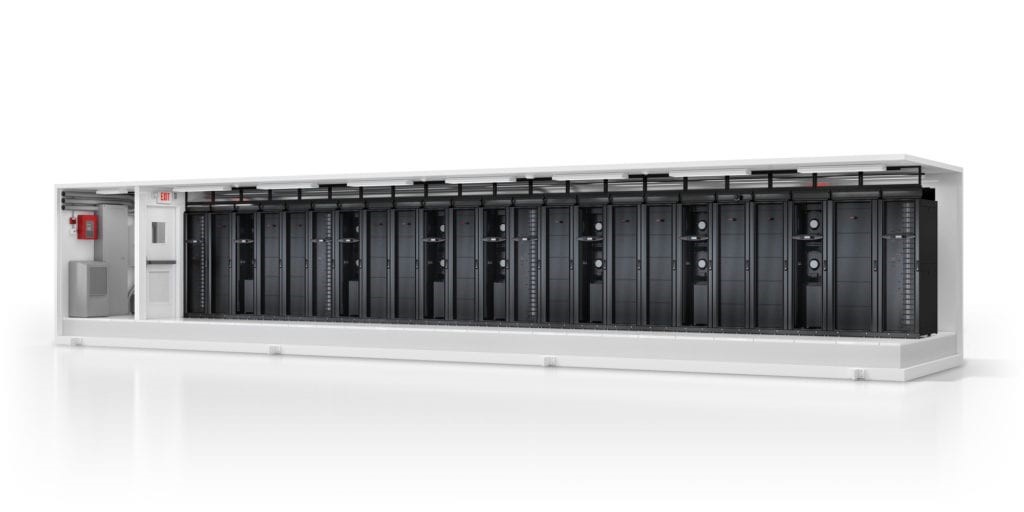Health care institutions were already facing significant challenges with the boom in digitisation, Internet of Things (IoT) technology, real-time patient tracking, demands of an aging population, and keeping up with an ever-changing regulatory environment. Now add a global pandemic to the list. The result is unprecedented demand for connectivity, power reliability and patient care capacity.
One solution that addresses these three critical hospital priorities is prefabricated, modular data centres, which are self-contained enclosures that house IT capacity in amounts large, medium and small; along with all required power and cooling infrastructure.
Prefab data centres offer several benefits to hospitals: efficiency, flexibility, predictability and speed.

- Modular data centre units that sit outdoors free up capacity for more patient rooms, critical hospital operations and other requirements within their walls.
- The flexible design allows quick addition of IT capacity as demand warrants, while avoiding over-building to meet expected future requirements. A modular data centre can be operational in six to nine months from design to final approval. This reduces hospital data centre deployment time by 50% compared to traditional builds – speeding up their ability to deliver patient care.
- Hospitals become more resilient and achieve higher levels of performance predictability. Modular data centres are built in a factory setting under highly controlled conditions and are thoroughly tested before shipping to the hospital location. This is a recipe for success.
- Health care institutions do not have to manage two construction projects at once: building the data centre facility itself, and then building out the data centre with power, cooling and IT infrastructure.
Greater Toronto Area hospital demonstrates the value of prefabricated modular data centres in a health care setting
Mackenzie Health outside Toronto provides a case study highlighting the value of prefabricated, modular data centres.
When Mackenzie Health was building its new hospital in Vaughan to work in tandem with its existing Mackenzie Richmond Hill Hospital, the company opted for the Schneider Electric Prefabricated EcoStruxure™ Modular Data Centre to be located in two large modules outside of the new hospital building. Mackenzie Health had experience with modular data centres, having installed one in 2013 to increase the IT capacity at its Mackenzie Richmond Hill Hospital.
Prior to implementing the prefab data centre in Richmond Hill, Mackenzie Health had IT equipment in various locations throughout the hospital, including in closets and the basement – a typical story for many hospitals. The prefab unit enabled them to pull it all together into one purpose-built enclosure, without the cost and complexity of renovating inside the hospital. The data centre’s modular nature also means it can easily be expanded when demand warrants – no need to over-build capacity before it is really needed.
Mackenzie Health wanted that same kind of flexibility and scalability for its new Cortellucci Vaughan Hospital. By placing the modular data centre outside in modules, Mackenzie Health would never have to worry about converting patient rooms or other areas to house IT equipment; it could simply add modules if and when needed.
It was also faster to deploy. While the hospital building was still under construction, Mackenzie Health was able to prepare the concrete pad where the modular data centre would sit. At the same time, the data centre itself was being built off-site in a Schneider Electric factory. Instead of having to wait until the hospital building was finished, Mackenzie Health was able to put its new data centre in place in November 2019, while hospital construction was still underway. IT hardware, such as servers and switches were installed, brought online, and tested in parallel with the ongoing hospital construction, enabling IT and hospital systems to be up and running sooner.
The new data centre has a capacity of 500kW, enough to support 45 IT racks. It is a Tier 3 data centre, with 2N power redundancy and N+1 cooling architecture, enabling it to withstand the failure of any single component.
“By installing Schneider Electric Prefabricated EcoStruxure Modular Data Centre featuring an all-in-one portable and stackable design, we maximized the use of our time and resources, says Felix Zhang, Chief Technology Officer, Mackenzie Health. “We are the first hospital in Ontario to have two of these prefab modular data centres connected by a fiber-optic cable installed between the two hospitals. Our data centres will help ensure the ultimate network for our hospital facilities. In the event of an outage at one site, a back-up will be available at the other site ensuring minimal downtime. This means our nurses and physicians will be able to provide continuous, quality care to patients without interruption.”
Monitoring in-hospital IT infrastructure with on-premise Data Centre Expert
As early adopters, Mackenzie Health opted to install the Schneider Electric EcoStruxure Data Centre Expert on-site to monitor, in real time, all physical infrastructure at their premises. This enables IT staff to keep tabs on the data centre and in-hospital IT infrastructure.
Customers today can get additional benefits and even more peace of mind, if they select Schneider Electric EcoStruxure IT Expert, a cloud-based monitoring platform that enables IT staff to proactively monitor and manage the data centre from anywhere they have an Internet connection, via a smart phone app or web browser. The platform also provides analytics to help get to the root cause of problems and performs health check assessments on critical infrastructure, such as uninterruptible power supplies (UPSs) to ensure continuity of hospital critical operations.
Adoption of smart technology powers Healthcare Systems
Both of Mackenzie Health’s hospital sites will have all the IT infrastructure they need to drive a smart hospital initiative, which includes the adoption of an electronic medical record platform along with various intelligent building technologies, and more.
Prefabricated, modular data centres are an effective, fast and flexible way for health care systems to keep up with the rapid growth they are currently facing, deliver better patient care and improve the patient experience. To learn more, check out the various options for IT and power modules.



